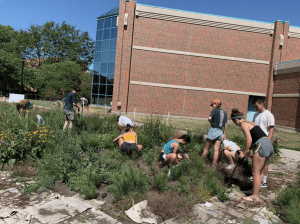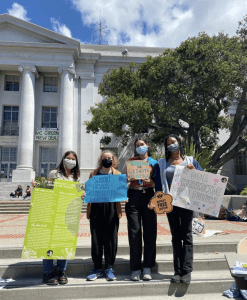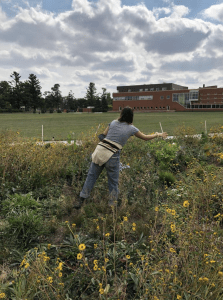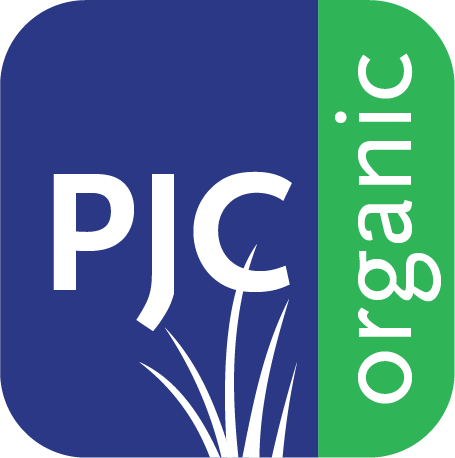Sure, October is the time to indulge in all things fall, but – arguably more importantly – October is Campus Sustainability Month. This is an annual event hosted by the Association for the Advancement of Sustainability in Higher Education (AASHE). So yes, it’s time for apple picking and pumpkin carving, but it’s also time to celebrate the strides for higher education sustainability.
Join us in our conversation with Re:wild Your Campus…

We spoke with Sheina Crystal from Re:wild Your Campus—formerly known as Herbicide-Free Campus— to hear more about the work on college campus grounds going organic. Sheina is the Director of Communications and Campaigns at Re:wild Your Campus, a women-led, youth-run organization helping the next generation advocate for herbicide-free practices on their campus grounds and create more biodiverse environments.
What does Re:wild Your Campus do? Re:wild Your Campus equips college students with tools, strategies, and resources to eliminate the use of herbicides on campuses. The organization also works to make campuses more climate resilient by building soil health, incorporating native plants, designing landscapes that save water, and increasing edible landscapes.
What is your Fellows Program? The paid student fellowship is designed to support students in advocating for the environmental sustainability of their campus grounds. Students apply in the spring and the fellowship follows the traditional academic calendar, running this year from August 2022 to May 2023. Once selected into the fellowship, students participate in our Groundup Advocacy Bootcamp, have campus strategy meetings with staff every other week, as well as monthly cohort-wide trainings and continued support throughout their campus campaign to ensure its success.Through the innovative fellowship, students gain valuable skills that can be applied to future environmental, social, and political activism efforts.
Why college students? Colleges have always been epicenters of social change, from free speech, antiwar, to divestment. In this case, students are directly affected by chemical use on their campus. Perhaps most inspiring is the potential for these students to continue to affect change after the fellowship.

Within a few years, these fellows will graduate and their community will shift and grow. From there, they can continue to make a difference in the world of sustainability using the tools and skills they develop in the fellowship program. For example, Tommy Hexter—a former Grinnell fellow—was elected as a member of the Poweshiek County Soil and Water Commission. He is now a Rural Organizer and Educator at the Iowa Farmers Union where his knowledge surrounding pesticides and environmental justice will undeniably make a difference.
Colleges and universities enroll 19 million students each year, representing a bigger population than 46 of the 50 states–only California, Florida, New York, and Texas have more residents. These institutions spend upwards of $671 billion each year, positioning them as powerful economic drivers and trailblazers in the environmental movement.
How are you connected to ASSHE? Re:wild Your Campus is an organizational partner of ASSHE. Aliza McHugh—a staff member of Re:Wild Your Campus—is also on the AASHE Advisory Council where she gets to give input around AASHE STARS. Right now, we are advocating to make it mandatory when filling out the grounds section to disclose which pesticides and fertilizers universities are using.
When did Herbicide-Free Campus become Re:Wild your Campus? After many months of discussion with Re:wild, in early September, Re:wild Your Campus officially became a project of Re:Wild and changed from its former name “Herbicide-Free Campus”. This change allows the organization to broaden their scope beyond eliminating chemical herbicides/pesticides to include the larger ecosystem. Accordingly, efforts include building soil health, looking at ways for campuses to save water, and incorporating more native plants and edible landscapes. Despite the change, Re:wild Your Campus remains a financially independent project.
What barriers do you face in your work? There are a few primary barriers: Firstly, the aesthetic goals of a campus—everyone wants a pristine lawn. Secondly, it’s difficult to get groundskeepers on board with a new approach when they are already overworked and underpaid. Thirdly, working within school budgets and looking for grants and funding for campuses to transition to organic. Lastly, the misconception that organic lawn care isn’t effective and the expectations that organic land care won’t perform as well as synthetic products and conventional methods.
Are you trying to eliminate lawns? Some! Our first priority is to eliminate herbicides/pesticides and get students and campuses thinking about “decolonizing aesthetics.” This means encouraging students to research what plants are native to their area and what the campus may have looked like prior to its construction and even further back, prior to colonization. We believe that all outdoor space is important – gardens AND turf – to preserve biodiversity, protect pollinators, and promote healthier environments. And that also means challenging campus aesthetics and critically thinking, do we need a lawn here? What purpose does it serve? is there a way we can redesign the landscape to help mitigate climate change?
How is Dewayne Johnson involved with Re:wild?

Dewayne “Lee” Johnson is on our Advisory Board and he helps to guide our work and provide advice as much as he is able. Lee is a former groundskeeper who was diagnosed with Non-Hodgkins Lymphoma. He sued Monsanto on the basis that the company’s herbicide product—specifically Ranger Pro, which contains glyphosate—caused his cancer. Lee ended up winning the lawsuit, and expressed interest in getting involved with our campaign to ensure that nobody would ever have to go through what he is going through.
Re:wild Your Campus worked with a coalition to bring Lee and his family to Hawaii. After the Hawaii Department of Education heard his story, they decided to ban herbicides from every public school in the state. Lee Johnson is a constant source of inspiration for us, as it’s always important to remember that the people who are spraying the poisons are not our enemies. In fact, they are often told that the products they use are safe enough to drink. It’s crucial to work with groundskeepers and come at this problem with solutions, not just the mindset of fighting against what someone has been trained to do. Read more of Lee’s story in “The Monsanto Papers”.
Will you expand beyond college campuses? Right now, Re:wild Your Campus is all about educating students to make an impact at their schools. There’s been interest from high schoolers and the organization is definitely available to be a resource to anyone! It’s hard to think about expanding when there are still so many colleges to change. The U.S. has 5,300 colleges and universities and each one can make a difference in protecting the environment.
What’s on the horizon for Re:wild Your Campus? Re:Wild Your Campus is currently working with 20 student fellows at 11 different colleges and universities and is always seeking to expand to more schools. The organization is also developing a Campus Certification Program to provide resources and create measurable organic standards for schools. Lastly, their Back-to-School Fundraiser is going on now with a goal of raising $50,000! 100% of funds will go towards Re:wild Your Campus’ programming. This allows them to continue their work with college students across the nation.
We left our conversation with Sheina encouraged by their boots on the ground efforts. Re:wild Your Campus has made important strides in bridging the gap between students and practitioners on sustainable land care standards. From gardens to lawns and sports fields, big change is on the horizon for university grounds.
Are you a school grounds team ready to go organic?
If you are a school looking to implement organic turf care, we are always here to help. PJC provides support services for schools and municipalities. We have substantial experience programming organic athletic fields and general use grounds. We have developed different “performance tiers” to help meet budgetary and usage needs based on a school’s expectations.
Want to support college campuses going organic? Get involved? Learn more?
- Donate to Re:wild Your Campus’ Back-to-School Fundraiser going on through October 13th 2022.
- Follow the work of Re:wild Your Campus on their website, Instagram @rewildyourcampus, or Facebook page.
- Join the AASHE Community! AASHE connects and equips students, faculty, administration, and industry experts to effect change in the world of higher education sustainability.
- Register for AASHE’s Global Conference on Sustainability in Higher Education. The conference runs virtually Oct. 18, Oct. 26 & Nov. 3. Registration is open through Thursday November 3, 2022.
- Search #CampusSustainabilityMonth on social media for posts on university and industry participation.
- Contact PJC with questions on organic turf care management!
